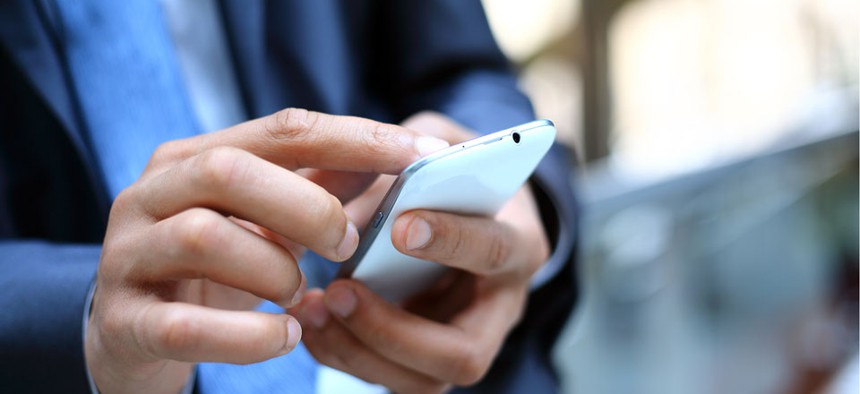Mobile Devices Will Transform How Government Fieldwork Gets Done

TATSIANAMA/Shutterstock.com
IPads and iPhones can do more than make field workers more efficient in creating reports and reducing paperwork.
Ian Baker is a partner and global government industry leader at IBM Global Business Services.
From social workers to police officers, many state, local and federal employees often worry about the unknown knowns -- things identified in files somewhere but unknown to the civil servant in the field.
Lacking the appropriate insight -- like operating with blinders on -- can make their jobs immensely tougher.
Police officers dread finding out the speeder they let off with a warning was wanted for bank robbery. Customs officials worry they won’t receive an alert about counterfeit goods until after they have cleared a suspicious container. Social workers fear learning too late the new boyfriend in a single mom’s life has a history of child abuse.
The problem is that data and corresponding insight into issues such as these reside in many different places.
Even back at the office, key pieces of information don’t turn up in basic searches. And at their desks, few workers have time to do more than enter their field notes in the computer system. They’re not empowered with the kind of contextual insight on the spot that can help make better-informed decisions in the field.
Devices Can Help Uncover Hidden Relationship and Critical Data
Using mobile devices like iPads and iPhones can do a great deal more than make field workers more efficient in creating reports and reducing paperwork.
The devices become even more powerful when they provide analytics to uncover hidden relationships and critical information.
The ability to automatically analyze multiple pieces of data across multiple systems of record and combine that with real-time information collected by the user, can help provide previously unknown new insights and recommendations.
For these workers, it is the combination of mobile devices and analytics insight delivered via secure, well-designed apps that is key to transforming how government fieldwork gets done.
Government leaders want to produce better outcomes for the citizens they serve. Unlike the commercial world where the focus is on driving out costs and boosting profitability, the imperatives of government are improving service within budget constraints.
Government is an industry of industries. Public safety, border control, education, social services and tax assessment all have different priorities and different metrics. But in almost every service, there are mobile workers who are disconnected from troves of useful data. Giving them mobile devices that provide contextual insight will remove a major pain-point in their operations but more important, it can change how these people perform their jobs.
Mobile Devices Keep Caseworkers Closer to Citizens
Social workers provide a great example of how mobile apps can improve services. There are 600,000 caseworkers in the U.S. and about 2 million worldwide. Every one of them is burdened by paperwork.
They typically go to the home of a vulnerable child or adult, ask questions, take notes and pictures and then go back to their office to write up reports on a computer. Once the data is filed, it becomes the basis for deciding what benefits and services to provide.
Mobile devices can keep the caseworker much closer to the citizens and much more responsive.
With an iPad, the caseworker could conduct interviews in a forms-based screen, or use intelligent capture or analysis of the spoken word. They may jot down notes with a stylus or their finger while getting intelligent prompts and guidance from the app on what to look for next. They could also take pictures using the device. Any previous reports could be accessed online.
Social workers try to get background information on everyone who spends time with a vulnerable client. They try to detect warning signs of physical danger or fraud. A mobile app could automatically help create genograms showing direct and indirect relationships.
Information on those living in the household or visiting frequently may reside in multiple different government databases. Analytics engines could be used to highlight issues and even suggest additional questions as the interview progresses. The app could give caseworkers better insights into the case.
In some instances, he or she will be able to tell the recipients the agencies’ decision about additional benefits or required interventions at the end of a visit rather than making the client wait for weeks.
The goal is to create shorter cycle times, more accurate assessments and better outcomes. And reducing the time spent in the office filing reports will leave the caseworkers more time to spend with the people who need services.
Devices and Apps Need to be Secure
Other agencies are also going to benefit from development of mobile apps.
If a customs inspector in one port discovers a shipment of counterfeit goods, he could send out an alert to all inspectors detailing information about the shipper and photos of the evidence with predictive insight into when and where the next shipment could appear.
A police officer sent to a scene might get a display showing where other officers are located, based on GPS reports from their iPhones, and how they could best position themselves for maximum security while pursuing a criminal.
Some of those kinds of capabilities are available in popular public apps like Twitter and Tinder. But for government work, the apps need to have stringent security and authentication features.
The devices will need predictable configuration, substantial capacity and guaranteed availability. Most government workers won’t be able to run the apps on their own devices.
Developing secure, intelligent mobile apps to help transform government jobs is going help make workers more productive and give them new insight to be more effective.
That's a significant difference not only for civil servants but for the citizens they serve.
(Image via TATSIANAMA/Shutterstock.com)






 By
By